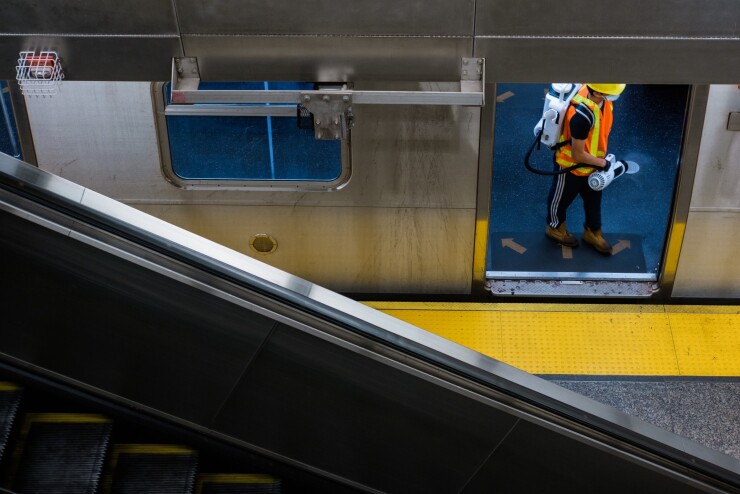New York’s Metropolitan Transportation Authority will go into a planned $258 million negotiated sale of transportation revenue refunding green bonds with another COVID-19 related hit from the capital markets — a two-notch downgrade from Fitch Ratings.
Fitch late Friday lowered the MTA’s primary credit, its transportation revenue bonds, two notches to A-minus from A-plus and its TRB anticipation notes to F2 from F1. The outlook is negative.
The MTA is clearly short on options other than more borrowing as it projects a $12 billion deficit through next year without further federal aid. Severe ridership drops due to the pandemic have drained farebox revenue — more than half its operating source — and Congress is stalled over the latest rescue package.
“This is obviously more bad news for the MTA, even before it thinks much about raising new debt, as opposed to refinancing,” said Nicole Gelinas, a senior fellow with the Manhattan Institute for Policy Research. “Fare-backed revenues, a 40-year mainstay, are not worth much when fares are down 70% and the outlook for the next half decade is so uncertain.”

JPMorgan is set to price the Series 2020E transportation revenue refunding bonds on Thursday.
Fitch cited “significant deficiencies in the MTA's credit profile,” which it expects to extend beyond the life of a routine cyclical downturn. The “breadth and acuity” of coronavirus-related pressures have neutralized key credit strengths, Fitch said.
“Fitch’s rating action reflects the continuing severe impact of the COVID-19 pandemic on MTA's essential public transportation services," MTA spokesman Aaron Donovan said. "We continue our call on Congress to provide $12 billion in emergency aid. In the absence of this support MTA is preparing for the draconian actions that will be necessary to achieve financial balance as required in our enabling statutes.”
According to data on the Municipal Securities Rulemaking Board's
Amid shutdowns and stay-at-home measures to counter the pandemic, MTA costs have spiked because of deep cleaning necessary to maintain the system.
The state-run MTA, one of the largest municipal issuers with roughly $46 billion in debt, operates New York City’s subways and buses, two commuter rail lines and several interborough bridges and tunnels.
Projected operating budget gaps of $3.2 billion in 2020, $5.8 billion in 2021, and $3.5 billion in 2022 — relative to an annual operating budget exceeding $17 billion — will probably force deficit borrowing in the absence of additional $12 billion in federal stimulus the MTA is requesting, Fitch said.
“To ensure anything close to a robust transit recovery and thus a robust urban recovery, the federal government is the only game in town here,” Gelinas said.
Fitch estimates the MTA has $2.9 billion in additional borrowing capacity following its sale of $450 million of bond anticipation notes to the Federal Reserve’s Municipal Liquidity Facility in August.
"As this latest downgrade indicates, the MTA borrowing from the Fed's MLF program should be seen as a 'bridge loan' rather than a substitute for federal emergency aid," said Rachael Fauss, senior research analyst for the good-government group Reinvent Albany. "Federal emergency aid for the MTA remains crucial so that service cuts can be avoided and capital work can continue — both of which are essential to the long-term recovery of the New York City region.
"Further, the MTA should work with the Fed and congressional leaders such as Senator [Charles] Schumer to seek lower rates and extension of the MLF program beyond Dec 31, so that the MTA can borrow more slowly as needed."
New York State has also authorized the MTA, through 2022, to borrow up to $10 billion to fund operating costs.
“The more efficient way to finance in the long run would be to tax and then spend. We’re not going to do that, so then we fall back into the ‘what else can we do?’, ” board member Norman Brown said on last week’s Volcker Alliance webcast about infrastructure spending.
The specter of public-private partnerships looms, Brown said.
“It’s inserting itself in the discussion because of the failure of government to finance these things. This is sort of the sound of government drowning in a bathtub.”
Brown also noted the interest among foreign pension funds in U.S. infrastructure. “It’s almost as if we’re a sitting target, since we’re unable to tax, they can come in with their actual pension funds that are under some level of pressure in the U.S., to fund things that our governments can no longer fund.”
As of Oct. 19, the MTA reported $5.24 billion in liquidity to cover operating costs with what Fitch estimated is a burn-rate of roughly $300 million per week. Liquidity resources include $2.05 billion of cash, $1.85 billion of undrawn or unspent commercial bank lines of credit, with the MTA authorized to solicit up to an additional $1 billion in bank facilities, pending market conditions.
It also has $1.17 billion of internal available flexible funds, and $174 million in other post-employment benefit, or OPEB, reserves. According to Fitch, the reported cash position is net of amounts set aside to fund the upcoming November transportation revenue bond debt service payments.
While the MTA received $4 billion of the $25 billion transit agencies received under the CARES Act that passed in March, Congress is gridlocked about further rescue aid with a national election looming.
The MTA, whose board will meet Wednesday, will present its calendar 2021 and four-year financial plan at next month's board meeting. The board will act on that plan in December.





